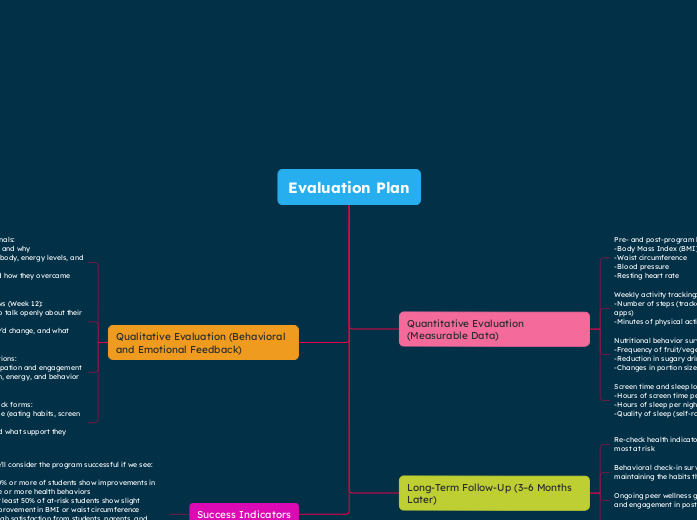Evaluation Plan
Quantitative Evaluation (Measurable Data)
Pre- and post-program health checks:
-Body Mass Index (BMI)
-Waist circumference
-Blood pressure
-Resting heart rate
Weekly activity tracking:
-Number of steps (tracked via pedometers or apps)
-Minutes of physical activity logged per day/week
Nutritional behavior surveys:
-Frequency of fruit/vegetable consumption
-Reduction in sugary drinks and snacks
-Changes in portion sizes
Screen time and sleep logs:
-Hours of screen time per day
-Hours of sleep per night
-Quality of sleep (self-rated by students)
Long-Term Follow-Up (3–6 Months Later)
Re-check health indicators for students who were most at risk
Behavioral check-in survey: Are students maintaining the habits they built?
Ongoing peer wellness groups: Monitor attendance and engagement in post-program activities
School-level evaluation:
-Have any policies changed (e.g. healthier cafeteria options, movement breaks)?
-Are there new wellness initiatives inspired by the program?
Qualitative Evaluation (Behavioral and Emotional Feedback)
Student self-reflection journals:
-What habits they changed and why
-How they feel about their body, energy levels, and mood
-Challenges they faced and how they overcame them
Focus groups and interviews (Week 12):
-Small group discussions to talk openly about their experience
-What they liked, what they’d change, and what they learned
Teacher and staff observations:
-Changes in student participation and engagement
-Improvements in attention, energy, and behavior in class
Parent surveys and feedback forms:
-Observed changes at home (eating habits, screen time, activity)
-How involved they felt and what support they need going forward
Success Indicators
We’ll consider the program successful if we see:
-70% or more of students show improvements in one or more health behaviors
-At least 50% of at-risk students show slight improvement in BMI or waist circumference
-High satisfaction from students, parents, and staff based on feedback
-Increased engagement in physical activities and healthy eating
-New or continuing health initiatives supported by the school
